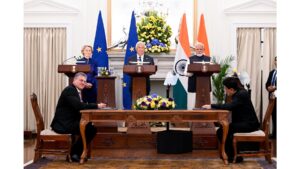Research, Innovation and Science Diplomacy in Action
“The geopolitical importance of the Mediterranean cannot be overstated. The region connects three continents and acts as a bridge to the European Union for important exchanges amongst people, our economies and on security. With the new Pact for the Mediterranean we open a new chapter and a chance for more productive cooperation and lasting stability in the region.” – Kaja Kallas, High Representative for Foreign Affairs and Security Policy/Vice-President of the European Commission.
A New Chapter in Mediterranean Cooperation
One Sea, One Pact, One Future
Since 2024, the European Union has reshaped its approach to the Mediterranean, marking a shift in how Europe views and engages with its Southern neighborhood: Dubravka Šuica was appointed as the EU’s first Commissioner responsible for Mediterranean Affairs, a position created to facilitate shared priorities and cooperation between the EU and Mediterranean partners. This was followed by the establishment of the Directorate-General for the Middle East and North Africa (DG MENA), designed to coordinate initiatives in governance, energy, migration, and research. In addition, The New Pact for the Mediterranean was announced as one of the Commission’s flagship priorities for 2024–2029 and is expected to receive formal political endorsement in November 2025. Coming thirty years after the Barcelona Process first established the framework for Euro-Mediterranean partnership, the new pact represents a strategic evolution in EU diplomacy and demonstrates how soft power, particularly through scientific collaboration and science diplomacy, can maintain dialogue even during geopolitical tensions.
Built on broad and inclusive consultations with civil society, businesses and governments, it proposes concrete initiatives across three strategic pillars:
- People: driving force for change, connections and innovation
- Stronger, more sustainable and integrated economies
- Security, preparedness and migration management
Research and Innovation: Building Bridges Through Science
Research and Innovation (R&I) have become a powerful tools of diplomacy in the Euro-Mediterranean region. Several initiatives illustrate how this cooperation is taking shape:
The ongoing Partnership for Research and Innovation in the Mediterranean Area (PRIMA) exemplifies research diplomacy in action. PRIMA is a ten-year initiative (2018-2028), operating as a joint EU programme under Article 185, meaning it gets funding from both the EU and participating countries. Twenty countries participate: Bulgaria, Croatia, Cyprus, France, Germany, Greece, Israel, Italy, Luxembourg, Malta, Portugal, Slovenia, Spain, Tunisia, Turkey, Algeria, Egypt, Jordan, Lebanon, and Morocco. PRIMA brings together EU Member States and southern Mediterranean partners as equal contributors to tackle shared challenges. The EU’s total contribution to PRIMA will be up to €325 million (€220 million from Horizon 2020 and €105 million from Horizon Europe), while Participating States will contribute approximately €384 million, totaling €709 million for the program period. In April 2024, the partnership was successfully extended by three years (2025-2027), with the continuation of the PRIMA annual transnational calls for proposals until 2027.
At the 30th Union for the Mediterranean (UfM) Research and Innovation Platform Senior Officials Meeting in Cairo on October 3, 2024, discussions focused on implementing the UfM Roadmaps on Health, Renewable Energy and Climate change. New working groups were established to coordinate cooperation across the region.
In April 2024, the Euro-Mediterranean Hub for Research and Innovation was launched, providing a centralized digital “one-stop shop” for Mediterranean R&I actors, connecting research results, networks, policy papers and funding opportunities across health, renewable energy and climate change.
In May 2025, the Mediterranean Initiative II under Horizon Europe was launched with approximately €165 million, reaffirming EU’s commitment across its Southern neighborhood, to support regional research projects in these same areas and promoting co-creation and co-ownership with Mediterranean partners.
More recently, on October 23, 2025, research and innovation leaders from Europe, Africa and the Mediterranean came together in Brussels for the Innovation Fair 2025, showcasing transformative solutions from vaccine development to renewable energy systems. The event brought together over 500 participants on-site and more than 200 online from more than 40 countries, featuring 43 pitches from start-ups, SMEs, research teams and Business Support Organisations.
The Path Forward
As of November 2025, the New Pact for the Mediterranean is at the political endorsement phase, meaning that EU Member States and southern Mediterranean partners have been invited to formally agree on its strategic priorities and framework. Under the Pact, we can expect a wave of activities in research and innovation, the launch of new collaborative projects, the expansion of existing initiatives, and the mobilization of funding benefiting all participating countries across and beyond the Mediterranean region.The 2026 UfM Ministerial Conference will be a key moment to align on actions and implementation of initiatives.
For all EU members, including Hungary (which has been a full member of the Union for the Mediterranean since its founding in 2008), doors for Mediterranean cooperation are open. While the final list of endorsing countries is yet to be confirmed, the initiative offers all partners an opportunity to work together to address interconnected challenges and build lasting stability and prosperity.
Photo: commission.europa.eu






